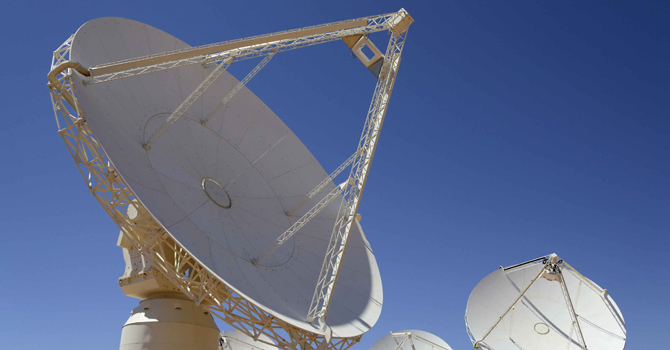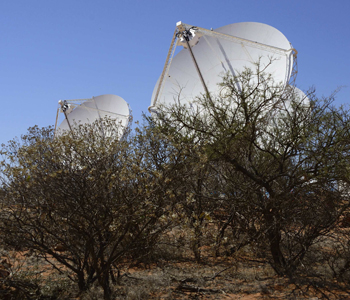MURCHISON, Australia. Fri Oct 5, 2012 - In the remote Australian outback, scientists have launched the world's fastest radio telescope which will exponentially increase astronomers' ability to survey the universe, mapping black holes and shedding new light on the origins of galaxies.
The Australia Square Kilometre Array Pathfinder (ASKAP), with an array of 36 antennas each 12 meters (40 feet) across, started peering into the universe on Friday from a far-flung cattle station in Western Australia state.The A$152 million ($155.18 million) telescope will "listen" to radio waves from the cosmos that might give astronomers insights into the beginnings of the universe.
"Radio waves tell us unique things about the cosmos, about the gas from which stars were formed, and about exotic objects, pulsars and quasars, that really push the boundaries of our knowledge of the physical laws in the universe," Brian Boyle, the director of the project at Australia's national scientific research organization, told reporters this week.
The ASKAP telescope is located in the Shire of Murchison, an area of 50,000 square kms (19,300 square miles), or the size of Costa Rica, with barely 120 people. The location is ideal because it is "radio quiet", or lacks man-made radio signals that would interfere with the antennas picking up astronomical radio signals.
Using new "radio cameras" called phased array feeds, the telescope will be able scan the sky much more rapidly than existing radio telescopes and will give the telescope a field of view about 150 times the area of the full Moon.
ASKAP is also the first building block in the world's largest telescope, the Square Kilometre Array (SKA) which will be based in both Australia and South Africa.
Construction of the SKA will begin in 2016 and Australia will add another 60 antennas to its current 36 as part of the project.
"BALLS OF STAR STUFF"
Dishes from the Australia Square Kilometre Array Pathfinder are seen at Murchison, Western Australia October 5, 2012. - Reuters PhotoThe ability of the ASKAP telescope to scan so much of the universe will generate immense amounts of data. On its first day in full operation, ASKAP will collect more data than is currently contained in all current radio astronomy archives or the U.S. Library of Congress.
Using existing radio telescopes, an image of Centaurus A, the closest galaxy to earth with a black hole, would have required some 400 images, two years of observation, and 10,000 hours of computer time. The ASKAP will take a mere two images and five minutes of observation and computer time.
ASKAP is already fully booked for the next five years with scientists from all over the world using it for research.
Some of the first areas of enquiry will include a census of all galaxies within two billion light years, which may shed light on how the Milky Way was formed.
Another research project will look for black holes, which astronomers think may be the seeds of galaxies.
The radio telescope will also probe objects such as pulsars, which Boyle described as "balls of star stuff that are so tightly packed together that a teaspoonful would weigh more than the mass of humanity".
But will the telescope be looking for extra terrestrial life?
"It's not a primary of many of these surveys, but it's certainly a secondary goal that you almost get for free," Boyle said.
"As you're surveying the sky, particularly over wide areas of sky looking for objects, you are also increasing the search volume for signals from extraterrestrial life."















































Dear visitor, the comments section is undergoing an overhaul and will return soon.